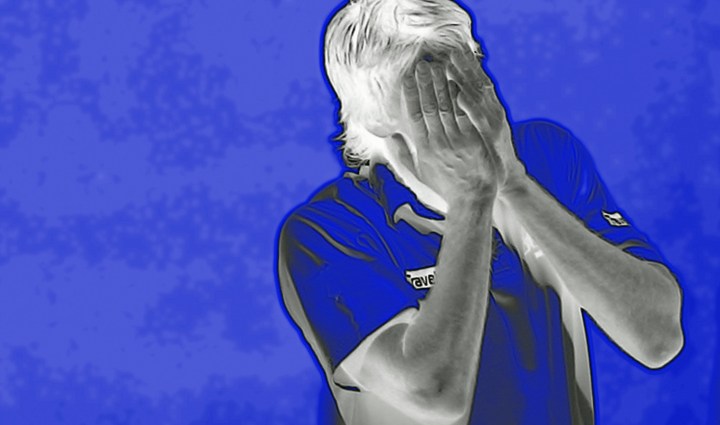Daily Maverick 168 Sport
Dominici’s death shines the light on rugby’s battle with depression

It’s important to acknowledge mental health. We have to talk about the demons, because they do exist.
First published by Daily Maverick 168 weekly newspaper
A relentless wave of despair carried former rugby star Christophe Dominici to the roof of an abandoned building on 24 November. Having convinced himself that his journey had come to an end, the 48-year-old stepped off the edge and fell to his death.
Tributes poured in for a player who embodied France’s joie de vivre between 1998 and 2007. Those closest to the man, however, spoke about Dominici’s long battle with depression, citing his aptly titled autobiography, Bleu a l’ame (Blue in the Soul).
Others went as far as saying sport, and rugby in particular, has to learn from this tragedy. The mental health of athletes has to be a priority rather than an afterthought.
Daily Maverick spoke to two prominent international coaches, a mental conditioning specialist and MyPlayers, the organisation that protects the South African players’ interests, about the elephant in the room.
While systems have been implemented to address a range of mental health issues, there is certainly room for improvement.
“South Africans don’t like to talk about our vulnerabilities or our weaknesses. I believe that we should be more open,” says Heyneke Meyer, who built a dynasty at the Bulls in the 2000s before going on to coach the Springboks between 2012 and 2015.
Meyer also holds a degree in psychology.
“We as coaches have a responsibility to help these individuals when they are with us. You should know when your players are not in the right mental space. You should always be looking out for the signs.”
Gary Gold is a well-travelled coach who has worked with the Springboks and the Stormers, as well as London Irish, Newcastle, Bath, Worcester and Kobe. The Cape Town native is currently the USA head coach.
“I’ve seen how these issues can escalate and lead to the worst possible outcome,” Gold reveals. “You can never take this lightly in life, and I’d go as far as saying you should be even more vigilant when dealing with these issues in professional sport.
“During my time in Europe, I had two England internationals come to me with problems. The situation was so bad that I gave them time off to get medical help. To see these grown men crying in front of me… it made a big impression.”
Former Springboks such as Joe van Niekerk and AJ Venter have been vocal about their own battles with depression. Cheetahs flank Teboho ‘Oupa’ Mohoje recently encouraged players with problems to come forward. Most South African players, however, suffer in silence for fear of being labelled ‘weak’.
“There is still a stigma attached to mental health and a lot of players find it challenging to speak openly about the status of their own mental health,” says Hilana Claasens, an industrial psychologist who serves as MyPlayers national player development manager.
According to Claassens, the biggest mental concerns in 2020 included uncertainty about when the game would resume, the loss of income, being confined at home for a long period, contracting Covid-19 and the fear of loved ones getting sick.
In a ‘normal season’, of course, the players face other significant challenges. And in the internet age, players have been exposed like never before.
Gold believes that former players in particular should take care when passing opinions on their contemporaries, whether expressing their views on TV, in a newspaper or on their own social media platforms.
“Former Springboks who played in the 1970s or 1980s often bemoan how soft rugby has become and in some instances dismiss the importance of mental health. It’s completely irresponsible. I don’t think they understand how different the game is today.
“Back when they were playing, they didn’t know what people were saying about them unless they picked up a newspaper. Nowadays, you can’t shut out the noise and you have to find a way to deal with it.
“It’s important to acknowledge mental health. We have to talk about the demons, because they do exist.”
Meyer believes that more teams should view the appointment of a designated mental coach as a necessity rather than an extra.
“When something happens, and it’s often when a player is far from home, the mental coach should be on hand to help the player through the problem.”
Henning Gericke joined the Bulls as a mental coach ahead of the recent Super Rugby Unlocked campaign. Gericke has worked with the Proteas and Bafana Bafana, and was on the Springbok coaching staff when the team won the World Cup in 2007.
“I understand that most people don’t want to come forward and speak about their issues,” Gericke says. “But if they know that they’re in an environment that accepts them, and they have someone who they trust to speak to, they are more likely to communicate what’s wrong.
“It’s great to have questionnaires and a 24/7 helpline – I know that in some instances players don’t want to reveal their identity. But if your aim is to help the players on a long-term basis, and to keep an eye on the problems before they get out of hand, you have to be working with [them] day-to-day.”
Most players battle to cope after retiring from the game. Citing his past experiences with various players, Meyer paints a bleak picture for those who aren’t able to adapt.
“Even those who go on to lead successful lives admit that it takes about two to three years to adapt and deal with the fact that they’re a normal person again. Some don’t make it, though, and sadly commit suicide.” DM 168
This story first appeared in our weekly Daily Maverick 168 newspaper which is available for free to Pick ‘n Pay Smartshoppers at these Pick ‘n Pay stores.





















 Become an Insider
Become an Insider
This article deals with a very important issue of mental health. Yet … your headline (intentionally or unintentionally?) limits it to rugby ! Why ? Surely it is an aspect that impacts all codes of sports … and that matter, all other endeavors.